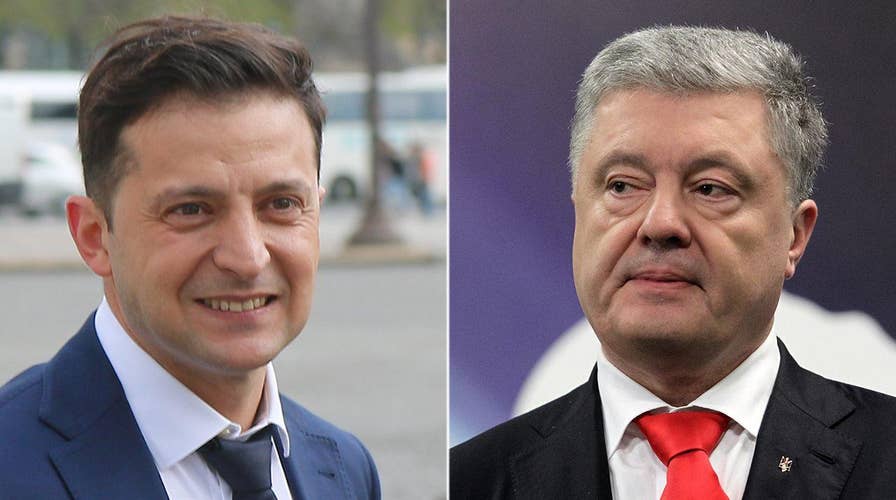Comedian could unseat Ukraine's Poroshenko in this Sunday's presidential runoff
A comedian who plays a president on a popular television show who has no political background may unseat Ukraine’s deeply unpopular and pro-western president, Petro Poroshenko this Sunday.
A comedian who plays a president on a popular television show who has no political background may unseat Ukraine’s deeply unpopular and pro-western president, Petro Poroshenko this Sunday.
The possibility of a political newcomer taking power at a time of upheaval in Ukrainian politics may make some in the West uneasy, but leaders have gained more confidence in Ukrainian democracy and are supporting free and fair elections no matter who wins.
Volodymyr Zelensky resoundingly beat out President Poroshenko in the first round of presidential elections on March 31, winning 30 percent of the vote compared to Poroshenko’s 16 percent.
The two will head to a second-round vote on April 21. A poll by the Kiev-based International Institute of Sociology ahead of Sunday put Zelensky's support at 48.4 percent, compared to 17 percent for Poroshenko and a further 17.9 percent undecided.

Ukrainian actor-turned-presidential candidate Volodymyr Zelensky seen talking to the media on April 5, 2019 (Pavlo Conchar/SOPA Images/LightRocket via Getty Images)
“Western leaders are a bit concerned but not to the level of opposing Zelensky for the presidency the way they opposed former President Viktor Yanukovych,” former U.S. ambassador to Georgia and Kazakhstan William Courtney told Fox News.
“Ukrainians have shown a healthy democratic tendency to support alternation in power. On multiple occasions the opposition has won the presidency and power was transferred peacefully, one of the hallmarks of democracy,” Courtney added.
Since declaring independence from the Soviet Union in 1991, Ukrainian voters have only re-elected a sitting president once and the outsider Zelensky stands a good chance of defeating the current president. Ukrainian civil society is very strong and voters appear ready to throw out yet another embattled incumbent.

Ukraine's President Petro Poroshenko, who was elected to office in 2014 (Anna MarchenkoTASS via Getty Images)
Zelensky is running as a truth-telling change agent who vows to fight Ukraine's rampant corruption.
On his widely regarded television show, 'Servant of the People', Zelensky portrays a political novice who vows to fight the country’s corrupt elite. The real-life upstart presidential contender mirrors his character, and it helped turn his campaign into a politically viable one, although critics say he is light on policy.
“Zelensky has maintained maximum flexibility during the election time by refusing to be tied down to a particular program," Senior Fellow at the Foreign Policy Research Institute Mitchell Orenstein told Fox News. "He has made few detailed proposals or policy statements. We have no idea what exactly he will do.”
On the most important issues facing the country, all candidates in the race took similar positions: combating rampant bureaucratic corruption, which has plagued Ukrainian politics for decades, resisting Russian aggression and interference as the deadlock in eastern Ukraine persists, and forging closer ties to the E.U. and NATO.
The election on Sunday comes down to the status quo and continuing the policies of the current unpopular president, or an anti-system candidate who represents a younger generation striving to rid the country of its widespread corruption.
“Zelensky will be elected to pursue a key element of the 2014 Euromaidan Revolution, to fight unaccountable and corrupt oligarchic rule,” Mitchell said.
The election comes at a time when Ukrainian governance is particularly weak and Russia still controls 7 percent of its territory.
Despite the candidate’s pro-western direction and opposition to Russia, neither Poroshenko nor his opponent has a coherent strategy for confronting Russia or retaking the territory lost to Moscow in 2014, events which catapulted Poroshenko to the presidency.
Poroshenko was first elected in 2014 following the Euromaidan Revolution that toppled the regime of former President Yanukovych, who abandoned closer ties to the E.U. after pressure from Russian President Vladimir Putin.
PRESIDENT OF UKRAINE PRAISES WAY TRUMP HANDLES PUTIN
Although Ukraine has made strides in fighting corruption since Poroshenko became president, it has not been enough to satisfy Ukrainians who are desperate for accountable leadership following the corrupt and authoritarian rule of President Yanukovych.
“Poroshenko failed to capitalize on a mandate from the 2013-14 Maidan Revolution to make deep economic reforms that could have improved people's lives, and progress in fighting corruption, such as by reducing the role of the state in the economy, including wasteful state-owned enterprises,” Courtney said.
Many in Ukraine feel the hopes and aspirations of the 2014 revolution were not achieved and blame Poroshenko for the revolution’s shortcomings.
Russia is also still trying to undermine Ukrainian politics and the democratic process, according to an E.U. watchdog group.
“Russia is not going all-out to support or oppose either candidate through active measures -- propaganda, disinformation, and subterfuge. But Russia is doubtless employing these techniques to send a message to whoever wins that it still has ways to influence politics in Ukraine,” Courtney said.
After the annexation of Crimea, Russian separatist forces in the Donetsk and Luhansk regions held a referendum in May 2014 to declare independence from Ukraine. They are the self-proclaimed Donetsk and Luhansk People’s Republics.
Since Russian separatist forces invaded eastern Ukraine, the conflict transitioned into a stalemate and the regions remain controlled by Russian backed rebels.
CLICK HERE FOR THE FOX NEWS APP
The United Nations says over 3.5 million people in eastern Ukraine will need humanitarian assistance and protection in 2019 and the violence has killed more than 10,400 people and displaced 1.6 million since the conflict began in 2014.










































